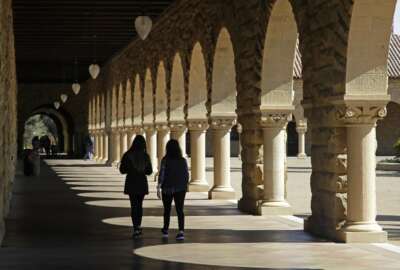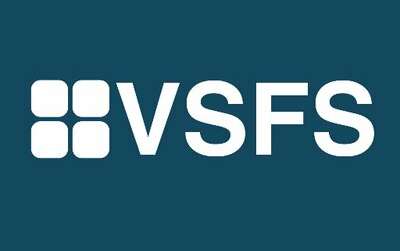
Interning virtually with the federal government
Like so many people with new jobs, this year's crop of summer government interns can't go work in the regular sense.
Best listening experience is on Chrome, Firefox or Safari. Subscribe to Federal Drive’s daily audio interviews on Apple Podcasts or PodcastOne.
Like so many people with new jobs, this year’s crop of summer government interns can’t go work in the regular sense. Not with pandemic having mostly cleared out federal offices. To get a sense of what the intern experience is like, Federal Drive with Tom Temin spoke to two of them. Sarah Stevens and Joshua Vooge are working at the State and Transportation Departments this summer under the auspices of The Fund for American Studies.
Interview transcript:
Tom Temin: Sarah, let’s start with you. Tell us a little bit about yourself where you’re in college and what you’re doing for State Department the summer.
Sarah Stevens: Hi, I’m Sarah. I am a rising junior at the University of North Carolina at Chapel Hill. I am a global studies in peace war and defense major and I just recently did an internship at the State Department under the Office of Central European Affairs.
Tom Temin: Okay, and Joshua, tell us about you.
Joshua Vooge: I’m a rising senior at the University of Nebraska Omaha and I’m majoring in history. This summer I interned the Maritime Administration, the Department of Transportation.
Tom Temin: Alright, Sarah, what was it like? I mean, the State Department has that beautiful headquarters and Foggy Bottom and lots of people running around clicking their heels in the lobby there. It’s quite a place. How did this operate? How did you manage to work with state?
Sarah Stevens: So the internship became virtual as in instead of having to work in DC, me and the other interns were working from home on projects. And we also had a video call every week with our supervisor.
Tom Temin: So once a week, you could see the supervisor, but otherwise you work on your own.
Sarah Stevens: Yes. Of course, there was email communication back and forth between the other interns, but it was mostly individual projects.
Tom Temin: But did you have someone in State Department you were working with that you could email or talk to? Or was it some kind of a collaboration with State or did you work just on a project separate from the daily operations of the department itself?
Sarah Stevens: The projects were more long term. For example, we were tracking when different elections were happening in Central European countries. So they weren’t urgent. But we did have a little more urgent projects in that we are supposed to listen in on different think tank events. And so those were a little more urgent. It was just a combination between the two.
Tom Temin: And what was the output they were asking of you? Reports or papers or that kind of thing?
Sarah Stevens: Yeah, there were both reports and papers. Yes.
Tom Temin: So those you would email in and get some feedback from your counterpart at the State Department?
Sarah Stevens: Yes.
Tom Temin: Did it work out pretty well, would you say?
Sarah Stevens: Yeah, it was a great experience.
Tom Temin: Alright. And Joshua, you spent a summer internship with the Maritime Administration, which is in Washington, I guess it’s the Navy Yard. Tell us what you were interested in and how did that relate as a history major, first of all?
Joshua Vooge: So this is my second summer doing the Fund for American Studies program. And when I was in DC last summer, I realized how much of a need there is for the research skills that one develops with a history major. I wanted to apply that to policy research. I was able to get this internship with the Maritime Administration, and there were two research assignments that they had me do. One was for the Committee on Maritime Transportation Services, CMTS. And what they wanted was a paper with technologies that they could look into to deal with the COVID-19 crisis in the maritime industry. And then there was a very similar project that the Advisory Committee for the Maritime Administration wanted a paper containing emerging technologies for further research when their committee considers that.
Tom Temin: And so you came up with papers and position documents, I guess, on these technologies on the COVID effect. By the way, what was the effect of the pandemic on the maritime enterprise?
Joshua Vooge: So with the US flag Ships there were the obvious concerns of how do we keep our US crew safe? And how do we allow them to be able to disembark their ships without there being the risk of the pandemic spreading. There’s also things of what technology could reduce person to person contact, look into how we could virtually inspect ships, how we could do the bill of lading system electronically and similar concepts.
Tom Temin: And Sarah was your counterpart that you were working with also teleworking? They weren’t going into a State Department office either, were they?
Sarah Stevens: Yes, they were teleworking.
Tom Temin: So did you get the sense that you missed something by not being in the daily bureaucracy and hearing the — well I don’t know if they still have telexes and fax machines at the State Department — but you get the idea, there’s crowds there and people working together. Did you miss that?
Sarah Stevens: Well, I definitely missed the physical element of being in DC. But I also met everybody else in the Office of Central European Affairs, and something my supervisor would do was, she would bring different people in different departments on our weekly meeting calls so we could ask them questions. So she really tried to bring more of a community feel into it.
Tom Temin: So you did have regular contact in the same way we are right now, which is on a video conferencing recording type of setup.
Sarah Stevens: Yes.
Tom Temin: And Joshua, how about you, similar idea? Did you check in weekly or how often were you in contact with people at Maritime?
Joshua Vooge: There was a group of three or four people who I worked with slash for who I met on a weekly basis, and then throughout the week, I’d meet with them individually for individual comments or edits that they may have had with the documents I’ve been working on. And then for both the documents I worked on, there were then these meetings I had a chance to present these documents to at the end of my internship,
Tom Temin: And the people you were dealing with were also working virtually?
Joshua Vooge: Yes. Once it was clear that some people could return to the building that the DoT is housed in, there were a few people who would pop in every now and then there, but almost everyone was working from home.
Tom Temin: Okay. And over the decades, the academic year seems to have shifted earlier and earlier. So people go back to college now in August. So Sarah, as you head back to UNC Chapel Hill, will you be going there? Will you be working from home? How’s that going to work for the rest of your collegiate experience this coming semester?
Sarah Stevens: Yes, I will be going back even though all my classes are online. I still will be going back to school.
Tom Temin: Okay, and I guess with social distancing, and then there’s lots of measures I imagine they’ve imposed on the campuses.
Sarah Stevens: Yes. So I’m living in an apartment this year. So I do not know much about the dorm situation. But for example, in order for social distancing, they’re making the changing time between classes longer, which isn’t exactly a problem for me right now. But yes, there are going to be more social distancing rules.
Tom Temin: And Joshua, what’s your situation? Well you’re rising senior, so you’ve got one year left at Nebraska.
Joshua Vooge: So several of the classes I’ll be taking this semester of classes that by the nature have to be taken either in a lab on campus somewhere. And so some of the things that University of Nebraska Omaha will be doing is having people sit every other seat. The university is providing all students two maks so that way we can have a mask that we’re always wearing. And then large events such as voting events, I think they’re still debating how they could safely do that.
Tom Temin: Well, this will be a summer for the memory books. Joshua Vooge is an intern at the Transportation Department. headed back to the University of Nebraska. Thanks so much for joining me.
Joshua Vooge: Thank you. It was a pleasure.
Tom Temin: And Sarah Stevens a rising junior at UNC Chapel Hill and recently completed an internship at the State Department. Sarah, thanks for joining me.
Sarah Stevens: Thank you so much.
Copyright © 2025 Federal News Network. All rights reserved. This website is not intended for users located within the European Economic Area.
Tom Temin is host of the Federal Drive and has been providing insight on federal technology and management issues for more than 30 years.
Follow @tteminWFED
Related Stories






